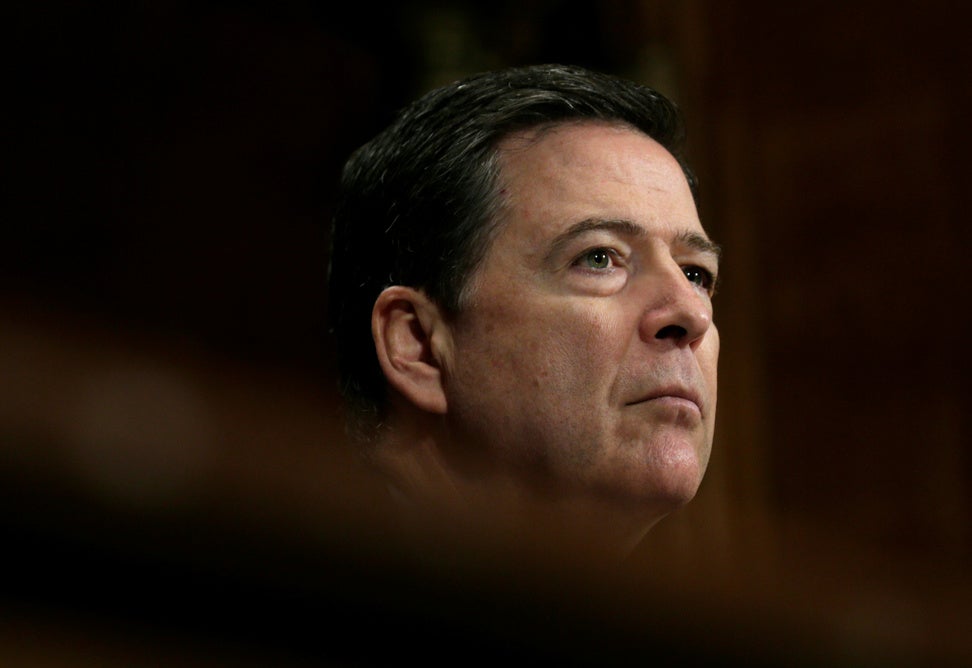James Comey to confirm Donald Trump tried to make him drop probe into Flynn's Russia ties and pledge loyalty
Fired FBI director to testify Trump asked for loyalty in most widely anticipated congressional hearing in years

The former FBI Director James Comey will confirm reports that Donald Trump put pressure on him to drop enquiries related to an ongoing investigation into Russia's meddling in the 2016 election, according to prepared testimony released before he gives evidence in the most widely anticipated hearing of its kind for years.
Mr Comey's prepared testimony appears to confirm past reports based on memos that the former FBI director wrote following interactions with the President, including a January dinner between the two when Mr Trump asked him if he wanted to keep his job before demanding loyalty. In other interactions between the two in February, the President pressured Mr Comey to drop an FBI investigation into former National Security Adviser Michael Flynn, who was forced to resign from his post a day earlier, and less than a month into the presidency amid concerns about his contacts with Russians.
"I hope you can see your way clear to letting this go, to letting Flynn go. He is a good guy. I hope you can let this go," Mr Trump said to Mr Comey during that Valentine's Day dinner, according to the testimony. Mr Comey didn't say that he would drop it.
Mr Comey immediately prepared unclassified memos about his conversations with the President regarding Mr Flynn, and had thought the request was concerning. After a call with FBI leadership, Mr Comey determined that it was important to try and avoid being alone with the President – he wrote that he was concerned that there was nobody who could corroborate that initial interaction regarding Mr Flynn – and later asked Attorney General Jeff Sessions to restrict any further one-on-one meetings between the President and himself. The attorney general did not reply to that request.
The two would speak at least twice more before Mr Trump abruptly fired the former FBI director, according to the testimony.
In a late March phone call, Mr Trump repeatedly complained that the Russia probe was creating "a cloud" that made it very hard for him to perform his duties as president, and asked that Mr Comey tell people that he was not investigating the President specifically. Mr Comey told Mr Trump that FBI protocol is to not make that information public because it would create an obligation to correct the record publicly if the probe ended up including the President.
"He said he had nothing to do with Russia, had not been involved with hookers in Russia, and had always assumed he was being recorded when in Russia. He asked what we could do to 'lift the cloud,'" Mr Comey's testimony reads. "I responded that we were investigating the matter as quickly as we could, and that there would be great benefit, if we didn’t find anything, to our having done the work well. He agreed, but then re-emphasised the problems this was causing him."
During a final phone call between the two, Mr Trump asked why Mr Comey hadn't got the word out that the President wasn't personally being investigated, to which Mr Comey said that he had sent the request along to the Justice Department but had not heard back. Mr Trump indicated that he would also ask the Justice Department to release that information, to which Mr Comey said that was the appropriate process for the request.
Mr Comey's testimony in front of the Senate has become one of the most anticipated hearings in modern political history.
The former FBI director was fired abruptly by the President, and learned of sacking during a meeting when he glimpsed the news playing on television. Following his firing, leaks detailing the information now corroborated by Mr Comey's testimony began to trickle out, leading to outrage in Washington and concerns that Mr Trump's actions constituted obstruction of justice – potentially an impeachable offence.
Meanwhile, Democrats have attacked US intelligence officials for refusing to answer questions publicly about whether Mr Trump asked them to influence the investigation.
In a contentious Senate Intelligence Committee hearing, Admiral Michael Rogers, head of the National Security Agency (NSA), and Mr Trump’s intelligence director Dan Coats said they did not feel that it was appropriate to comment in an open session on classified conversations they have had with the President.
Senator Angus King, an independent who caucuses with the Democrats, asked on what legal basis the officials were not answering certain questions.
“I feel it is inappropriate, Senator,” Mr Rogers said.
“What you feel isn’t relevant, Admiral,” Mr King replied.
A White House spokeswoman said she was not sure if Mr Trump had read Mr Comey's statement but said the timing of the release was “interesting".
Sarah Huckabee Sanders told reporters that she had not read it and was not sure if the President had read it while returning from an event in Ohio.
She said: "I do find the timing of the release a little bit interesting.”
Join our commenting forum
Join thought-provoking conversations, follow other Independent readers and see their replies
Comments